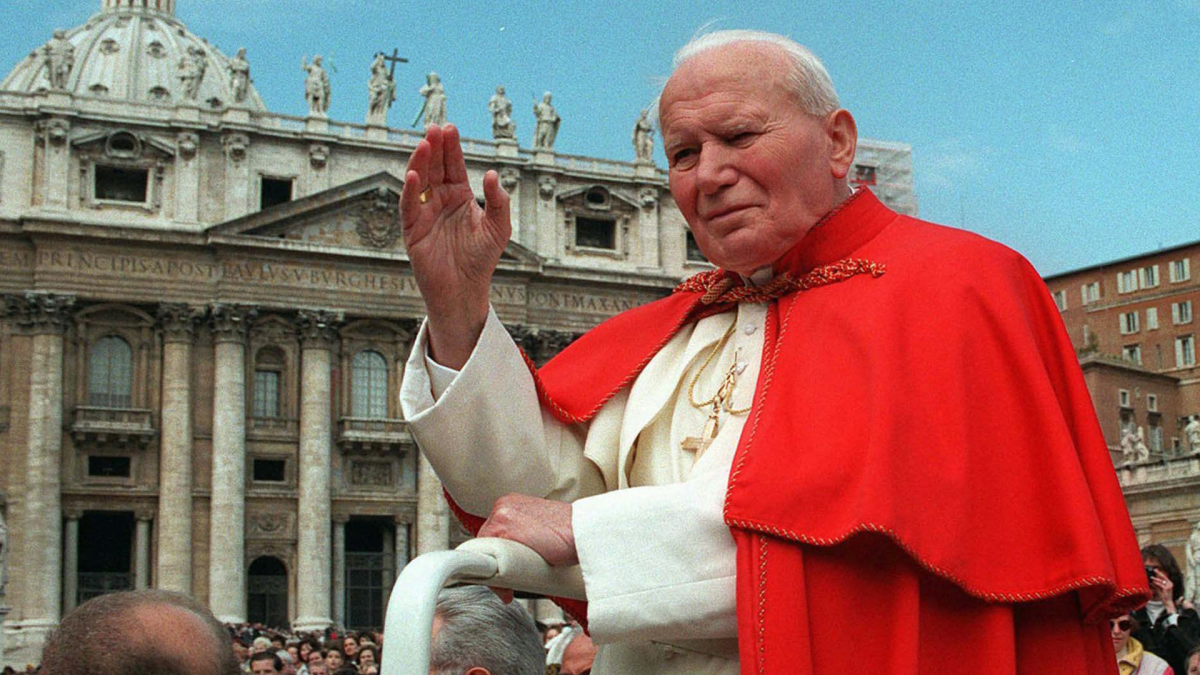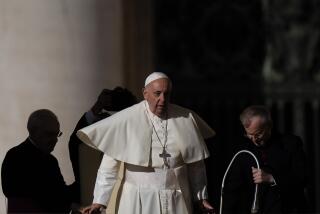Popes John Paul II, John XXIII to be canonized together in April

LONDON â The pope who tried to modernize the Roman Catholic Church and the one who directed its moral force against godless communism will be officially declared saints next April, the Vatican announced Monday.
John XXIII and John Paul II are to be canonized together in an unusual double bill that could see not just one but two of their successors attend the April 27, 2014, ceremony. It would be an unprecedented event uniting a pair of dead pontiffs with a pair of living ones, the reigning Pope Francis and the retired Pope Emeritus Benedict XVI.
Francis decided in July that the names of John XXIII and John Paul II would be âinscribed in the book of saintsâ at the same time, a clear signal of his personal admiration for and identification with their pontificates.
John XXIII convened the historic Second Vatican Council in the 1960s, which instituted such reforms as Masses in the vernacular, instead of Latin, to bring the church and the gospel closer to contemporary believers. Many of those changes remain controversial, but in a lengthy, recently published interview, Francis lauded Vatican II for reviving the faith and described its modernizing work as âabsolutely irreversible.â
âVatican II produced a renewal movement that simply comes from the same gospel. Its fruits are enormous,â the pope said.
The Polish John Paul II, the first non-Italian to lead the church in more than 400 years, was beloved by Catholics the world over for his warm, personal style and his unbending opposition to Soviet communism. Many see a similarity between his populist touch and that of Francis, who wades into crowds and embraces followers with equal enthusiasm.
The December date originally mooted for the double canonization was pushed back to April in part to make it easier for Poles to travel to the Vatican for the ceremony after the spring thaw. When John Paul was beatified in April 2011, a milestone on the road to sainthood, more than a million pilgrims descended on Rome to celebrate.
Unusual circumstances surround the canonization of both men. It has been centuries since anyone was declared a saint after death as quickly as John Paul II. When he died in 2005, mourners in St. Peterâs Square chanted, âSainthood now!â
As for John XXIII, who died in 1963, Francis ditched the usual requirement that a second miracle be attributed to his posthumous intervention.
As a mark of his respect, Francis prayed at both menâs tombs on the anniversary this year of John Paul IIâs death. Also, next Aprilâs ceremony falls on Divine Mercy Sunday, a feast day that was created by John Paul and that resonates with Francisâ emphasis on communicating Godâs mercy and compassion.
Whether Benedict XVI, who stepped down from the papacy in February, will attend is not yet clear. He harbors deep affection for John Paul II, whom he served in important positions at the Vatican for many years. But he also declared his intention upon retiring to retreat to a life of contemplation and prayer, an attempt to defuse any tension over the presence of two living popes.
Federico Lombardi, the Vatican spokesman, told reporters that Benedict was free to attend the canonization if he wanted.
âThereâs no reason, either doctrinal or institutional, that he couldnât participate in a public ceremony,â Lombardi said Monday. âI donât have any reason to exclude it.â
Lombardi also announced that the eight cardinals appointed by Francis to advise him on overhauling the Vatican would begin their inaugural three-day meeting Tuesday.
Bureaucratic infighting and corruption within the Curia, the Vatican administration, are believed to have contributed to Benedictâs decision to abdicate. The commission of eight cardinals reports directly to Francis, outside the regular Vatican structure.
Although no plans or proposals are expected so early in the process, Lombardi said that the pope, his aides and the commission have received a steady stream of input from senior clerics and others on reform. About 80 reports have already circulated among the commissionâs members, who come from six continents, including Cardinal Sean Patrick OâMalley of Boston.
ALSO:
Netanyahu heads to U.S. to âtell the truthâ on Iran
Chemical inspectors arrive in Beirut en route to Syria
Turkey announces reforms aimed at promoting peace with Kurds
Twitter: @HenryHChu
More to Read
Sign up for Essential California
The most important California stories and recommendations in your inbox every morning.
You may occasionally receive promotional content from the Los Angeles Times.











